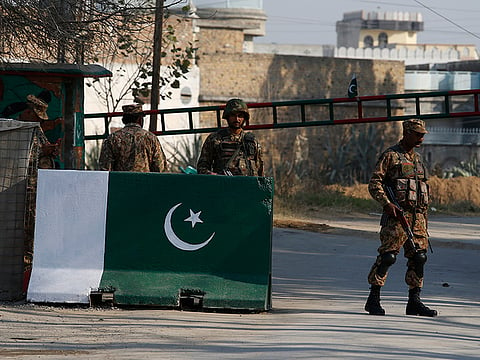Pakistan court convicts 31 over campus lynching of student accused of blasphemy
Mashal Khan, 23, was stripped, beaten and shot by a gang of mostly students

HARIPUR: A Pakistani court on Wednesday convicted 31 people over the campus lynching of a university student who was falsely accused of blasphemy, and sentenced one of them to death, a defence lawyer said.
Last April, Mashal Khan, 23, was stripped, beaten and shot by a gang of mostly students before being thrown from the second floor of his dorm at the Abdul Wali Khan University in the northwestern city of Mardan.
The killing sparked an outcry and raised fresh questions about the misuse of a harsh blasphemy law, which carries a death sentence for insulting Islam or the Prophet Mohammad (PBUH).
Barrister Ameerullah Chamkani told Reuters one of the 31 accused had been sentenced to death, five were jailed for life and the other 25 were jailed for four years.
The court acquitted 26 others out of a total of 57 people indicted by a court late last year.
Chamkani said he was awaiting more details on the judgement.
“One of the accused has been awarded a death sentence, [five] were given life imprisonment while 26 have been acquitted,” Saad Abbasi, a defence lawyer representing the accused, told AFP at the prison where the verdict was announced.
An additional 25 were given three-year sentences, he added.
The accused were students, teachers and some officials of the Abdul Wali Khan University named after a secular political leader in northwest Pakistan.
They all pleaded not guilty.
Ahead of the verdict announcement, heavy security was deployed at the jail in the city of Haripur where the accused were detained, with the area cordoned off by around 300 regular police and elite commandos.
Khan was known as an intellectually curious and religious student who liked to debate controversial social, political and religious issues.
He was attacked and killed by a mob on the campus on April 13 after a dormitory debate about religion.
The brutality of the attack, which was recorded on mobile phone cameras and posted online, stunned the public and led to widespread condemnation — including from prominent Islamic clerics — with protests erupting in several cities.
Students who participated in the lynching were later rounded up after being identified using CCTV footage from the university and video clips.
An official report released months later concluded Khan was falsely accused, saying the murder was instigated by members of a secular student group who felt threatened by Khan’s growing prominence as a critic of rising fees and alleged corruption at the university.
Blasphemy is an enormously sensitive charge in Pakistan, and a criminal offence that can carry the death penalty.
While the state has never executed anyone under blasphemy laws, mere allegations have prompted mob lynchings and lesser violence.
Since 1990, vigilantes have been accused of murdering 65 people tied to blasphemy, according to research compiled by the Centre for Research and Security Studies think tank.
Blasphemy is a highly sensitive issue in Pakistan, where insulting Islam’s prophet is punishable by death and blasphemy accusations stir outrage.
Even a rumour of blasphemy can spark mob violence and there have been cases of people spreading false accusations of blasphemy against enemies.
In 2011, a bodyguard assassinated Punjab provincial governor Salman Taseer after he called for the blasphemy laws to be reformed.
Taseer’s killer, executed last year, has been hailed as a martyr by religious hardliners.
Sign up for the Daily Briefing
Get the latest news and updates straight to your inbox


